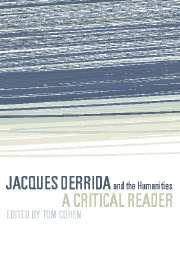Book contents
- Frontmatter
- Contents
- Preface
- Acknowledgements
- Biographical chronology
- Introduction: Derrida and the future of …
- Chapter 1 The future of the profession or the university without condition (thanks to the “Humanities,” what could take place tomorrow)
- Chapter 2 Derrida and literature
- Chapter 3 Derrida and gender: the other sexual difference
- Chapter 4 Derrida and aesthetics: Lemming (reframing the abyss)
- Chapter 5 Derrida and representation: mimesis, presentation, and representation
- Chapter 6 Derrida and philosophy: acts of engagement
- Chapter 7 Derrida and ethics: hospitable thought
- Chapter 8 Derrida and politics
- Chapter 9 Derrida and law: legitimate fictions
- Chapter 10 Derrida and technology: fidelity at the limits of deconstruction and the prosthesis of faith
- Chapter 11 Derrida and history: some questions Derrida pursues in his early writings
- Chapter 12 Derrida and psychoanalysis: desistantial psychoanalysis
- Glossary
- Index
- References
Chapter 2 - Derrida and literature
Published online by Cambridge University Press: 22 September 2009
- Frontmatter
- Contents
- Preface
- Acknowledgements
- Biographical chronology
- Introduction: Derrida and the future of …
- Chapter 1 The future of the profession or the university without condition (thanks to the “Humanities,” what could take place tomorrow)
- Chapter 2 Derrida and literature
- Chapter 3 Derrida and gender: the other sexual difference
- Chapter 4 Derrida and aesthetics: Lemming (reframing the abyss)
- Chapter 5 Derrida and representation: mimesis, presentation, and representation
- Chapter 6 Derrida and philosophy: acts of engagement
- Chapter 7 Derrida and ethics: hospitable thought
- Chapter 8 Derrida and politics
- Chapter 9 Derrida and law: legitimate fictions
- Chapter 10 Derrida and technology: fidelity at the limits of deconstruction and the prosthesis of faith
- Chapter 11 Derrida and history: some questions Derrida pursues in his early writings
- Chapter 12 Derrida and psychoanalysis: desistantial psychoanalysis
- Glossary
- Index
- References
Summary
For I have to remind you, somewhat bluntly and simply, that my most constant interest, coming even before my philosophical interest I should say, if this is possible, has been directed towards literature, towards that writing which is called literature.
What is literature?
–Jacques Derrida, “The Time of a Thesis, Punctuations”Literature is everywhere in Jacques Derrida's writing. It is there from one end to the other of his work, even in essays or books that superficially do not seem to involve “literature.” If Derek Attridge had not already invented or borrowed the phrase “Acts of Literature” as the title for his fine anthology of Derrida's writings about literature I might have called this chapter “Derrida's Acts of Literature.” The phrase “acts of literature” is a double genitive, subjective and objective at once. It names acts performed by literature, and at the same time acts that create or comment on literature. In what sense can literature, or writing about literature, or writing literature, or reading literature be an “act”? That is one of my main questions here.
Derrida, along with all the other things he is (as this volume testifies), is one of the great literary critics of the twentieth century.
- Type
- Chapter
- Information
- Jacques Derrida and the HumanitiesA Critical Reader, pp. 58 - 81Publisher: Cambridge University PressPrint publication year: 2002
References
- 6
- Cited by



